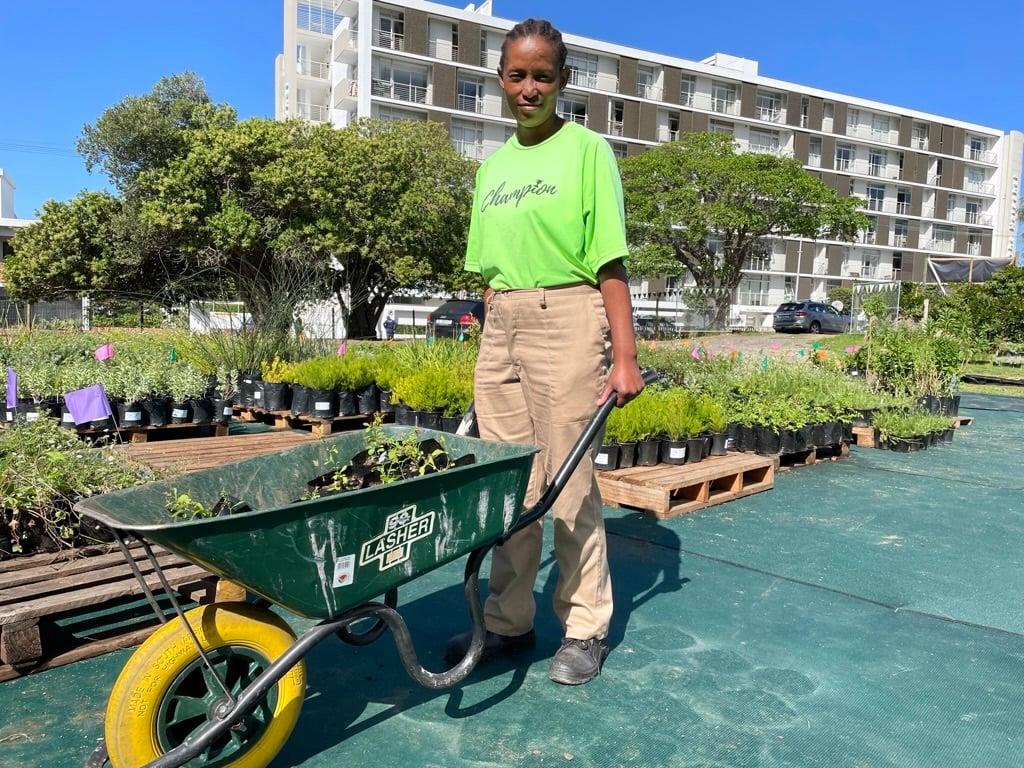Africa-Press – South-Africa. Nestled in the bustling suburb of Claremont, Cape Town, is Living Roots, an indigenous plant nursery run by formerly homeless people.
This quiet patch of nature is almost incongruous with its concrete surroundings. It’s flanked on one side by a Padel tennis court and on the other by a large apartment block. On most days, loud clanging can be heard from the construction site down the road.
But for U-Turn homeless ministries – the non-profit organisation that launched the social enterprise – this was the perfect location to build a project that educates the public about preserving the environment while creating sheltered employment opportunities for U-Turn’s ‘champions’ (those in the final stages of their rehabilitation programme).
Twenty-seven-year-old Zonke Baninzi, one of the champions, said working with plants had helped her find “peace”. She grew up in an abusive home and struggled with addiction. She was on the streets for 10 years before seeking help. “I love plants,” she said. “I love all that they give us as humans.”
Conservation horticulturalist Julia September pitched the concept for Living Roots to U-Turn. She is the nursery’s project manager.
September, whose expertise lies in ecological restoration and indigenous plant production, believes that nature has a healing quality. She hoped that restoring destroyed pieces of land would help the ‘champions’ in their recovery journey.
U-Turn media liaison Siwaphiwe Myataza-Mzantsi, said Cape Town is a “biodiversity hotspot”, but urban encroachment threatened the city’s natural heritage.
“The foundational connections between people and nature are often forfeited in the name of progress, leaving large areas of the city unnecessarily dominated by a stark environment, hostile to the human spirit and life itself. Densely urbanised and fragmented, a city is also near impossible for wildlife, like birds and insects, to navigate,” she said.
Living Roots is also raising funds to build a learning centre to teach the public about habitat conservation.
U-Turn has an agreement with 15 local growers whose indigenous plants are sold at the nursery. The enterprise also runs the Greening Kits initiative for local improvement districts to green their urban spaces with endemic plants.
They have been working closely with Observatory Improvement District (Obsid) on this project. Landscaping and workshops on water-wise indigenous gardening are some of the services the business offers.
Champion Carlton van Wyk, 41, said Living Roots offered employees training opportunities like first-aid courses, health and safety training, and a course on fynbos. “It’s so hard to find employment,” said Van Wyk, who hopes the skills will help him in the job market.
Myataza-Mzantsi said the nursery broadened the scope of the skills training U-Turn’s social enterprises could offer its champions. The non-profit has 12 charity thrift shops in Cape Town.
“Not everyone wants to work in retail or work on a construction site,” she said.
The profits from the nursery help fund U-Turn’s programmes.
Mark Jaftha said working with plants was a steep learning curve and compared their care to that of a baby.
“The more you feed it, the more it grows. Same as with recovery, the more you feed your recovery with positive things, the longer you’re going to stay clean off drugs. You learn a lot.”
The 34-year-old Jaftha celebrated one year of sobriety on Friday. He battled drug addiction for 15 years. “I’m looking forward to a new life sober,” he said.
Living Roots is hosting a family day launch event on 10 April at the nursery in Claremont.
For More News And Analysis About South-Africa Follow Africa-Press






